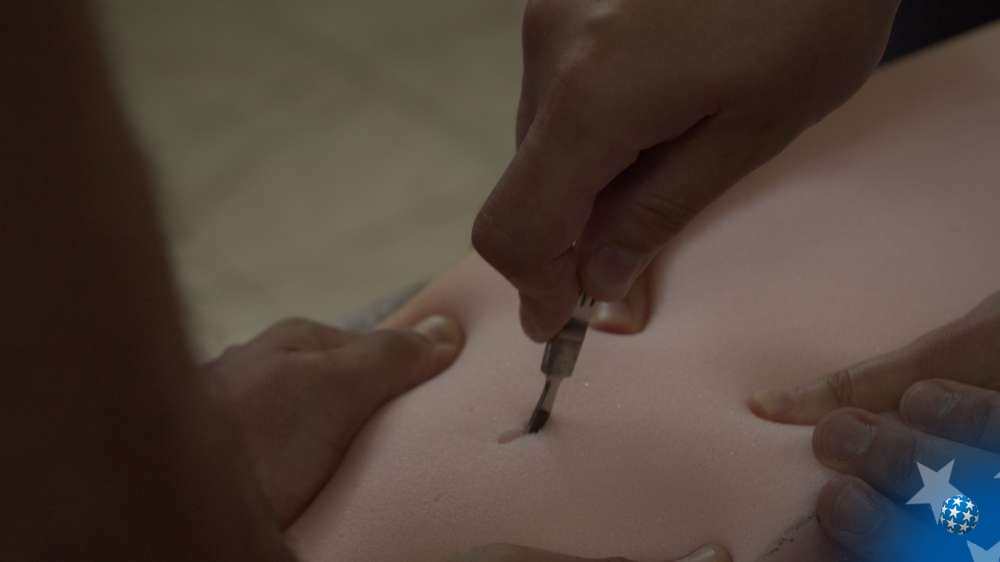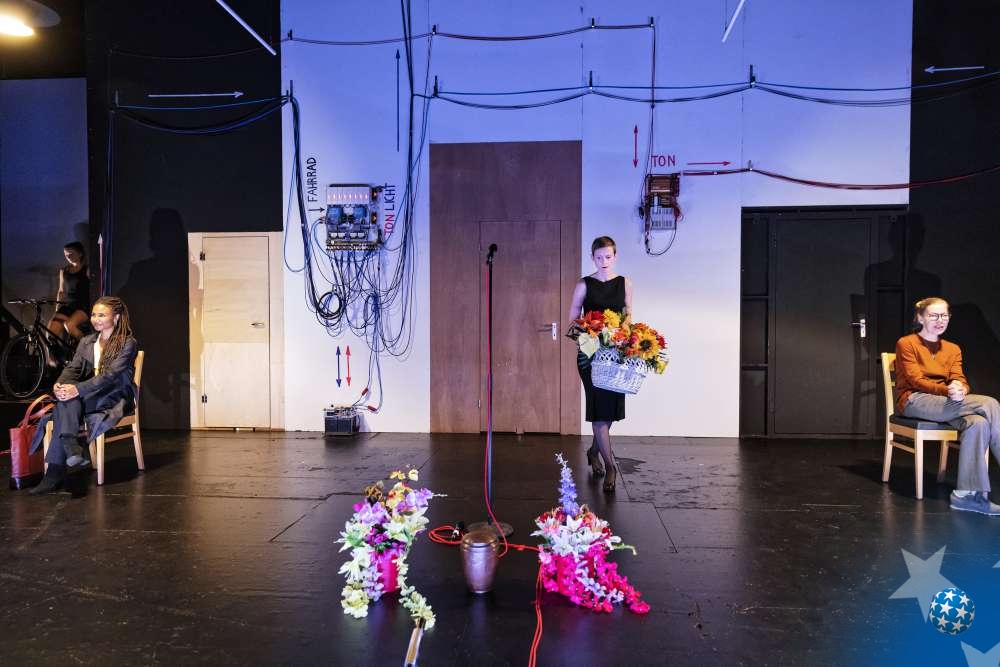- Bojan, although you are very busy at the moment, you have found some time for the festival blog and I truly appreciate that. You are currently working on the performance Dr. Ausländer (Made for Germany). Before you tell us some more about it, I’d like us to go a bit back and talk about your first theatre steps, which you made in this very festival. Could you share your earliest memories of Bitef?
My earliest memories are “Bitef Chronicles” on television. The first Bitef in which I saw the entire programme was the 30th one, in 1996, when I started my studies in theatre directing at the Faculty of Dramatic Arts in Belgrade. I had a chance to see the performances by Johann Kresnik , by Living Theatre, De Complicite, and the famous Argentinean company De la Guarda, and many other theatre legends. It truly was a spectacular festival edition.
- We are witnessing a massive emigration from Serbia. Many people are leaving in order to study, while hoping to find a job and stay abroad. We know that you finished three-year master studies in Amsterdam. While you were pursuing your MA degree, were you sure you would return to your country and resume your artistic practice, or you had a dilemma whether to leave everything and build your career abroad? What made you come back?
Various circumstances had my career linked both to Belgrade and to abroad, so neither coming back nor leaving seemed too radical. I did think about leaving for a longer period or for good, but the plans to return prevailed.
- You often attend foreign residencies where you do research and develop new projects. How important is it for you and for the development of your art? Where and how can young artists find those programmes and what would your advice be?
The most important thing for young artists is to listen to themselves, to recognize their needs and interests, and to follow them as much as they can. They should research, travel as much as possible, develop a healthy critical attitude towards formal education and artistic scene, and be aware of the fact that there is always something left out of the canon. Information is now much more accessible than twenty years ago when I was a student, it’s just important to find a focus. I realized quite early that I wasn’t much interested in drama repertory and I took every chance to obtain knowledge and do research in performing events, experimental writing for stage, and art theory, and that took me everywhere - towards group research and works through Walking Theory, and then to the cooperation with European festivals and institutions, where experimental theatre is not marginalized, as in Serbia it, unfortunately, still is. Another very important thing for me was also the cooperation and acquaintance with the colleagues from the region because we still do share similar cultural space and create a strong cultural scene which is still missing in the developed west-European context.
- Besides theatre directing, you are also active in visual arts. How do you decide whether something was going to become a theatre performance, film, or a drawing?
I’d say that I use performing events, theatre, and occasionally visual art to approach a common, divided time, attention and space… It is easier to communicate certain topics within institutional space, while others ask or suffice with flexible, experimental forms.
- I have just read the text for the new performance, which we await with abated breath, Dr. Ausländer (Made for Germany). How did you gather the material? Was it difficult to find volunteers ready to share their deepest fears, secrets and dreams? Were the dramaturges Mina Milošević and Tanja Šljivar the ones who communicated with them most, or did it all predominantly come from your idea and concept?
This performance was created out of the feeling that the accounts of migrations are constantly present in everyday life. Over the past five-six years, I heard quite a lot of them. While preparing for the research, we had an idea to conduct a pilot interview with people who are easily accessible, people from our closest surrounding, and use the results to organize larger focus groups, etc. However, when Tanja, Mina, my assistant Luka Jovanov finished with the first round, we realized that we have a truly exciting content, and that making it more comprehensive would turn into statistics, and that was not what we were interested in. Therefore, our subjects are the people we know first-hand, or acquaintances, friends of our friends or family. I cooperated with Mina and Tanja right from the start, and Luka joined us a bit later and, although I did have some general direction in mind, the performance developed through cooperation and dialogue, and each of us had a different focus. With Siniša Ilić, I touched upon the topic of migrations in a recent work we did together, which served as a basis for one of the scenes in this performance, while Maja Mirković and Biljana Tegeltija belong to our team as costume designers, and Marija Bulubdžić was in charge of music.
- Vulnerability of the people fighting for a better tomorrow is something that left the biggest impression on me. There is a shadow of collective dissatisfaction looming over the protagonists and they are trying to come out of it. How optimistic are you that something might change? Do you expect any change?
We shouldn’t expect too much from theatre. It can bring certain topics into focus, into, as Rancière would put it, re-distribution of the sensible in our public sphere and that’s it. It is not irrelevant but it cannot change the world. This problem does not apply only to Serbia or the region, or only to Germany, this is the organization of the world in which high standard of life of a small part of the world necessitates victimization of the larger part of the world. Wars, the exploitation of natural resources including people (ever since trans-Atlantic slave trade), displacement of the production out of the country, those are all strategies of ruling that help state borders and legal regulations set up unspeakable, inhuman differences between people born on different sides. How can those systems be abolished, how can those differences be erased, how can radical equality be reached, I don’t know… Historical Non-Aligned Movement worked on that, and it still does, on various levels and in various places throughout the world, and I want to believe that at some point, all of it will explode into something good for all of us.
- The text is performed by two actresses and two actors in a very specific setting of the lecture hall for the anatomy at the Faculty of Medicine in Belgrade. What was the process like? Was it easy for the actors and actresses to identify themselves with the documentary accounts? How close do you, personally, feel to this topic, and what made you make a performance about our medical professionals now, since we know that the process of their leaving the country has been going on for years?
As we have already mentioned, the problem of migrations has been present for very long - migrations from rural to urban area which are emotionally charged and represent the basis for the truth contained in folk music, then migrations of skilled workers after the Second World War, then the refugees from the war-torn Yugoslavia, and these now very visible epic migrations of people from the Middle East and Africa, who have become temporary citizens of our country. All of us have faced the story of migrations, directly or indirectly. That fact was very helpful in the process of deconstruing the material and construing the performance.
- Who is the main target audience, and what are you hoping to achieve - to dissuade someone from leaving, or actually motivate them to pack up their diplomas into suitcases?
Theatre shouldn’t either dissuade or persuade, that belongs to propaganda - what we are hoping to achieve is to shed some light onto this subject from various angles and offer personal perspectives about a huge global phenomenon. Just like the cast and the authors recognized themselves in many aspects of the story, the audience should be able to do the same. What happens then, what the recognition does to our soul and to our political and social views, that is something that theatre does not answer.
- The very idea of the venue puts it into a certain context. That is a place of ideas and dreams, the place where young future doctors study and prepare for their profession, and most of them for the first time face the unbearable reality which makes them consider the plan B, that is - leaving the country. Could you tell us something about your cooperation with the Faculty of Medicine, how did they react when they heard which issues you want to address? What did the professors say?
The architecture of the audience, the architecture of a university lecture hall, and what is called anatomy theatre (for dissection) bear close resemblance, and the lecture hall of the Institute for Anatomy offers further associations as well. Our cooperation with the Faculty of Medicine is excellent, and the reactions remain to be seen. I would like to use this opportunity to express our gratitude to our colleague Ana Miljanić and to Ivan Medenica, who both, in different ways, helped us get that exciting venue. To go back to your first question, my possibly most important memory of Bitef were performances out of theatre audience - I was fascinated by that as a student of directing, and I did a lot of research on that subject, and I saw many performances at unusual venues. That search for alternative venues and configurations of theatre and performances, that physical relationship between the audience and the performance, might be the aspect that mostly shaped me as a director.
- Cooperation with the visual artist Siniša Ilić dominates most of your work. When did you start your cooperation and how important is it to you to be surrounded with people you have already worked with?
Siniša and I have known each other since high school, and we’ve been cooperating for 25 years. That continuity of cooperation and thinking about theatre is precious and adds another layer to the collective process. I have a similar relationship with Maja Mirković and Dragana Jovović. I have cooperated with most of my associates for a very long time, but I find it equally important to always renew the teams, and meet some new artistic point of views. This is my first cooperation with the actresses Olivera Guconić and Dragana Varagić, while I know the actors Željko Maksimović and Aleksandar Đinđić from previous processes. In the past couple of years, we have been conducting a sort of mental and institutional experiment which implies publishing in theatre programmes a collective biography of the team of authors, and sometimes also the team of performers. The work on every performance creates a contemporary collective, those collectives then keep overlapping, combining, and settling down, thus developing the potential to give birth to something exciting.
- Dear Bojan, we have come to the end of our interview. Thank you for taking your time. We are looking forward to seeing your new performance, and we are expecting the reactions of the audience, which we will share on our blog. The audience will have an opportunity to see this performance after Bitef in the lecture hall of the Faculty of Medicine in Belgrade.

